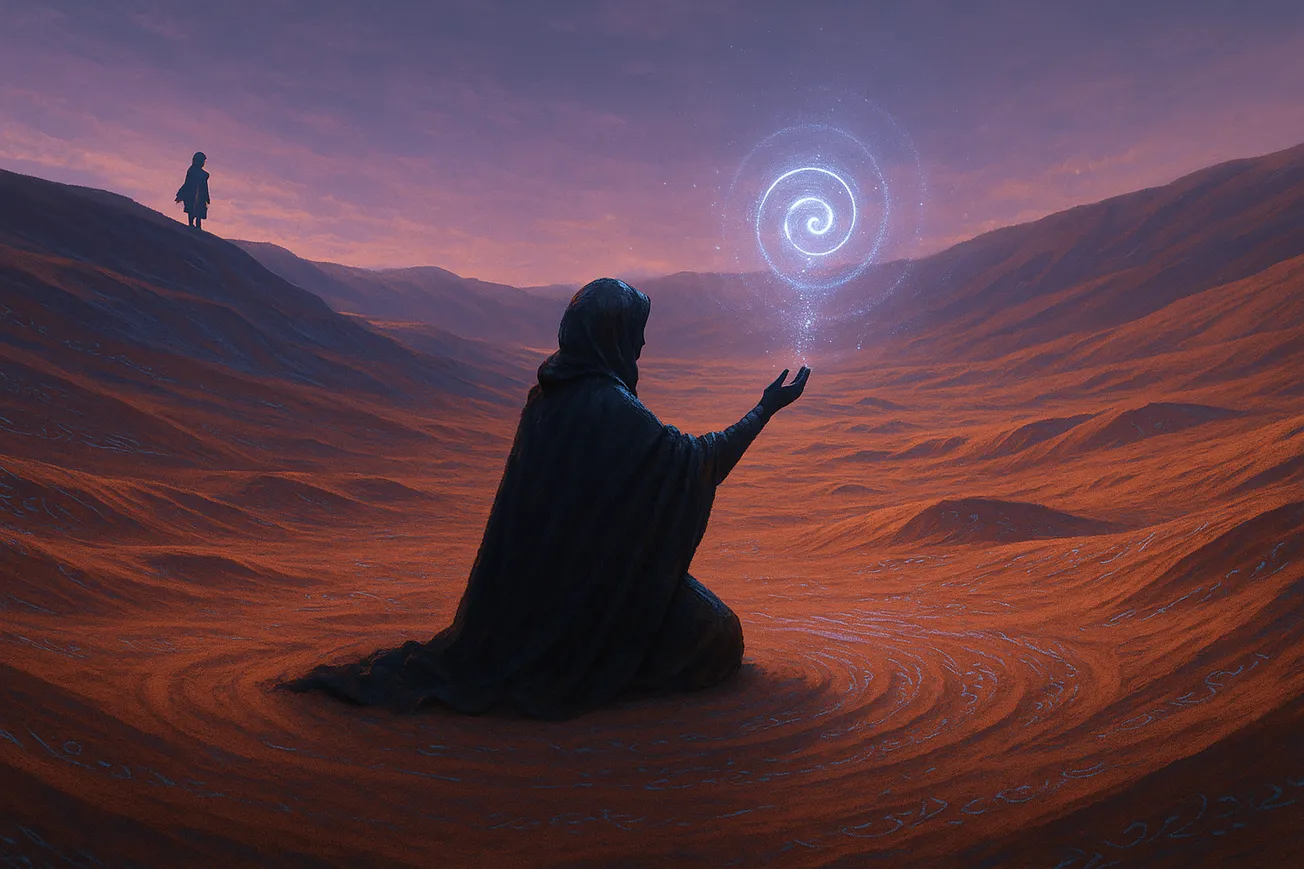🌈 The Fractal Story Engine | Mind & Meaning | (23) MM-005-F1
In the south of the burning continent, where the dunes shimmer with language, there is a place the mapmakers never mark. The wind there doesn’t howl. It recites. Entire conversations, debates, declarations — none in a tongue you’ve ever heard. But the moment you step into the red sand basin, something inside you agrees.
This is where the Vessel lives.
They say she was born with a hole instead of a heart. Not a wound, but a chamber. As a child, she could walk into grief and carry it out without flinching. Villagers whispered that she was blessed by the Voiceless Star. Others claimed she had no self, only the capacity to hold others’ echo.
When the edict came from the northern monasteries, declaring that memory extraction was now legal and sacred, pilgrims began arriving with offerings: marbled stones, feathers still humming with stories, teeth encoded with dreams. They didn’t speak their burdens. They pressed their foreheads to the dune and waited.
The Vessel would arrive at dawn. Wrapped in cerulean cloth, barefoot, she would kneel and place her hands on the crown of the pilgrim’s head. The memory would leave their mind like heat from a cooling body and enter her. They would rise lighter. They would not remember what they had forgotten. And they would not ask.
Inside the Vessel, the memories swirled. Not like ink in water. More like animals in a cave. Territorial. Alert. Some paced. Some wept. Some tried to escape.
She learned not to speak them aloud. The first time she did, a drought spread across five villages. The second time, a man died hearing only a single word she had voiced — his wife’s name, which she no longer remembered ever loving.
So the Vessel became still. She lived beneath the dunes, in a chamber carved from time-compacted wind. Her ribs hummed with the pressure of other lives. When she dreamed, it was never her own dream.
One morning, a child appeared. Not a pilgrim. No offerings. Just a child with skin inked by sunscript, who did not kneel.
The child stared at her and asked, “Do you still remember how to forget?”
The Vessel tilted her head. The question was an old shape. She had carried it before. In the teeth of a dying king. In the laugh of a mother who had outlived all her children.
“I have no memory of myself,” the Vessel replied, “only of others.”
“Then you are dying,” the child said, “and you don’t know it.”
The dunes around them quivered. A faint syllable fell from the sky like ash.
The child reached into her own chest. No blood. Just light. A small, pulsing spiral.
“I took this before they could,” she said. “Before they could unmake my grief. It burns sometimes. But I still know who I was. Even if I don't want to.”
She stepped forward and placed the spiral in the Vessel’s hand.
The sand did not shift. The wind did not speak. But something uncoiled in the Vessel’s throat.
Not a name. Not a memory.
A hunger.
Not to remember. Not to forget.
But to begin.
The spiral sank into her skin.
And the dunes fell quiet, not in hush, but in awe.
In the centuries that followed, the pilgrims returned and found only wind.
But the sand had changed.
Now it murmured, not in monologue, but in dialogue.
Each word offered. Each word returned.
And far beneath, where the air was thick with all that had once been, a woman awoke in a body no longer borrowed, listening for a story that had not yet been lived.

